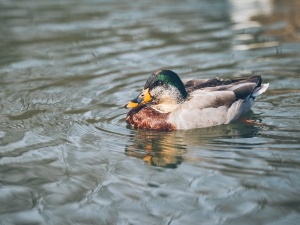
A sudden change in your duck’s behavior can be concerning. If your once energetic and happy-go-lucky duck starts to act lethargic, and not eat, then you’d be right to be worried.
This article explores why your duck is lethargic and is not eating, and what to do
Table of Contents
Duck lethargic and not eating:
If your aim is to raise happy and healthy ducks then their health should be your number one priority. Thus, a change in the bird’s health should be concerning to you. Here are reasons by this may be happening
Parasites:
Parasites love infecting birds like ducks, a parasitic infection may be the reason why your bird has a lack of appetite and is lethargic. A bird with symptoms like lethargy and a lack of appetite may have a gizzard worm infection.
The gizzard worm is a roundworm (nematode) that infects ducks and other waterfowl. These roundworms make their way to the walls of the duck’s gizzard and then live there.
Signs of this worm in ducks, apart from the loss of appetite and lethargy, include diarrhea, weight loss, and the eventual death of the bird if the bird is not treated.
Ducks become infected with this parasite through the ingestion of this nematode. The nematode can contaminate feed, soil, and water.
Ducks can also become infected with this parasite if they eat earthworms that are infected with this nematode.
What to do:
Treating the bird is easy, all you need is a suitable anthelmintic. An anthelmintic is a medication designed to kill worms.
Leamisole and Panacur can be used to treat your bird of their worm infestation, you’d need to speak to your vet about giving your duck these medications. Flubenvet and Ivermectin can also be given to your ducks to treat this condition.
Worming your ducks on a regular basis is recommended, this will help to prevent gizzard worms in your ducks. Routinely worming your ducks twice a year is recommended as well.
Illnesses:
Illnesses of all types can make your bird lethargic and lose its appetite.
One illness that can cause your bird to become lethargic and lose its appetite is avian cholera. Avian cholera is also called fowl cholera and is caused by the bacterium Pasteurella multocida.
This disease develops in areas where sanitation is poor and when there is standing water.
Symptoms of avian cholera, apart from the bird acting lethargic and not wanting to eat, include labored breathing, diarrhea, and mucus coming from the bird’s mouth,
What to do:
The first thing that you’d need to do is to take the bird to the vet to be diagnosed. Figuring out which illness your bird has, by yourself, can be tricky, this is why seeing a vet is recommended.
There is no treatment for this condition but you can treat the bird’s symptoms.
The recommended action to take if your birds have avian cholera is depopulation. After depopulation, a thorough cleaning and disinfection are recommended.
Giving the birds antibiotics is recommended, this will treat the birds but unfortunately, it won’t eradicate the bird’s illness. It will treat the birds by reducing mortality in your flock and the clinical signs of this condition.
Diet:
Your bird’s diet may be the reason why the bird is not eating. The bird not eating may be the reason why the bird is lethargic.
The bird’s diet may be adequate but the bird may simply not be interested in it and will refuse to eat. It is generally recommended that ducks be fed pellets but not all ducks will want to eat pellets.
A duck may try to eat pellets at first but they may discard the pellets from their bills when they realize that they don’t like them.
If the ducks really aren’t keen on the pellets then the birds may not try to eat the pellets in the first place and may become lethargic because they are hungry and are low on energy.
What to do:
If you realize that your ducks don’t enjoy eating pellets you can try feeding them something else like crumble or mash instead of the pellet feed.
If you’ve just started feeding your bird pellets then you can go back to feeding your bird what you used to feed it before switching to pellets.
You can also try mashing the pellets if the bird doesn’t enjoy the texture of the pellets, or, you can choose to ferment your bird’s feed, this may get them to eat and is nutritionally beneficial to the bird.
You may also have luck feeding the bird a different brand of pellets than you are currently feeding it.
If you enjoyed this article then you may also be interested in other chicken related articles. Here are some articles that you may be interested in: Wild Duck Limping, Duckling Curled feet, Hens Picking On Rooster, Duck Not Eating, How Do I Know If My Duck Is Dying

